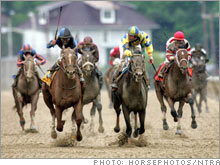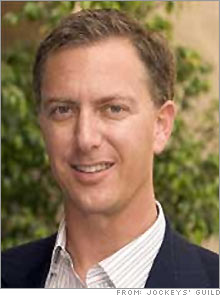NBA agent giving jockeys a liftJockeys finally close to winning modest but important gains in pay and insurance after turning to former agent for basketball stars.NEW YORK (CNNMoney.com) -- No two groups of athletes are farther apart than NBA stars and jockeys. And height is the least of the difference. The NBA is the land of guaranteed contracts, million dollar shoe deals and other endorsements, highlights on ESPN, and bling. 
Contrast that with the jockey's low-profile hand-to-mouth existence. Pay for a day's work can be as low as $30, while $240 can be considered a good day's pay - tip money to basketball stars. Forget lavish lifestyles - many jockeys can't afford basic insurance, despite a myriad of health problems associated with trying to stay at an unrealistically low weight. They face the risk of death or serious injury every day they are on the job, often without any financial protection that other Americans, let alone other athletes, take for granted. Dwight Manley is one of the few people to ever straddle both worlds. A year ago this week, the former agent of such NBA stars as Karl Malone and Dennis Rodman was invited to meet with leaders of the Jockeys' Guild, which functions as the union for the nation's riders. The Guild leaders were looking for a new national manager after the group's president, Wayne Gertmenian, was run out of town amid questions about how he and his allies spent the Guild's limited resources. There were also questions about why he had allowed the insurance that had once covered jockeys in case a catastrophic injury to lapse. Manley said he had never been much of a horse racing fan before that meeting, other than a couple of trips to the track with Rodman, and he didn't know much about the jockeys' plight. But when he learned about their work conditions, he quickly agreed to take the job - for zero salary. In fact, he's donated $80,000 of his own money to the fund that pays jockeys with permanent disability a modest $1,000 a month stipend. Manley said that because of the problems with Gertmenian, some jockeys were suspicious at the start. "Everyone was justifiably leery of an outsider," Manley said. "But I believe I've proven myself to the point where I have some confidence and support." One way he's proven himself is by already making some progress in negotiations with horse owners and tracks in less than a year on the job. He's said he's close to an agreement with one key state's horse owners association to raise the mount fee, the minimum paid to jockeys, to $75 from $45 - where it has been for decades. This deal will also cut the jockeys in for a share of the prize money that horse owners get when their horse finishes fourth or fifth. Currently jockeys only get a share of the winnings if they finish in the top three. "Right now there's not much incentive for a jockey if he's not going to be in the top three," said Manley. "This helps competition. It's a smart deal, it's good for everybody." Jockeys don't get to keep all of their earnings. They pay about a third to their agents who line-up their rides and their valets who help them with their equipment. I asked Manley if, after negotiating multi-million-dollar basketball contracts, it felt strange fighting for a $30 increase in the mount fee. "That $30 increase may not seem like much, but it's a huge increase if you're taking home $15,000 a year," he said. Steve Sexton, president of Churchill Downs (Charts), the company that owns the track that is home of the Kentucky Derby as well as several other top tracks, said that the sport will be better off with a stronger Guild. While it's the horse owners, not the tracks, that pay the jockeys, some of the other goals of the jockeys, including workers' compensation coverage for riders, would be at least partly paid out of the tracks' pockets. Sexton said he's been impressed with the leadership of Manley, who has already settled a legal dispute dating back to a November 2004 work stoppage by many of the jockeys at Churchill Downs. "I expected a little more of a Jerry Maguire type of agent, not one as candid as Dwight is. That was refreshing," Sexton said. "He's got ideas to promote jockeys and the sport. He understands if the industry pie grows, the jockeys' share grows with it." But despite the gains in Manley's first year, both he and Sexton said the Guild is probably a long way from accomplishing all of its goals. The Guild is still close to broke. Reinstating insurance that covers medical bills in the case of catastrophic on-track injury is still well out of its reach. So is arranging for an off-track health insurance plan that most jockeys can afford. Manley knows that he won't be able to transform the sport overnight. "You have the oldest sport in America, and you have 30-something states with racing, each with their own racing commissions and sets of rules," said Manley. "When something is 120-130 years old, change doesn't come quickly." But at least he's gotten off to a good start out of the gate. |
| |||||||||



